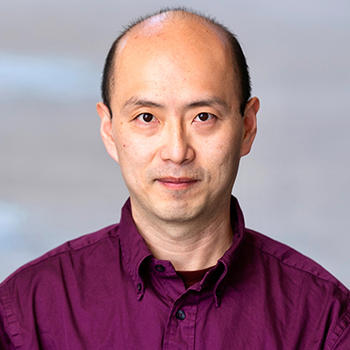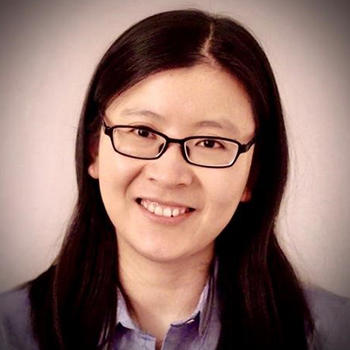A new $1.5 million study funded by the National Science Foundation will draw on the expertise of a transdisciplinary research team from George Mason University, the University of Virginia, and Syracuse University, in an effort to address the challenges involved in transitioning public bus fleets, including transit and school buses, to electric power.

The study, “SCC-IRG Track 1: Community-Responsive Electrified and Adaptive Transit Ecosystem (CREATE): Planning, Operations, and Management,” is headed by the principal investigator (PI) Jie Xu, a professor at George Mason’s Department of Systems Engineering and Operations Research in the College of Engineering and Computing (CEC).
The project team’s co-PIs from George Mason include Fengxiu Zhang from the Schar School of Policy and Government, Ran Ji from the Department of Systems Engineering and Operations Research in CEC; and Wenying Ji from the Department of Civil, Environmental, and Infrastructure Engineering in CEC. Also on the team is Jundong Li from the University of Virginia’s department of electrical and computer engineering.
Electrifying the nation’s bus fleets could significantly improve air quality and public health, especially in communities that have suffered from diesel exhaust pollution, says the Schar School’s Zhang. However, the shift to electric buses is complicated by several issues, such as limited driving range, long charging times, high upfront costs, downtime, a lack of skilled workforce, and varying priorities among stakeholders.
“Electrifying public fleets is crucial for reducing carbon emissions, improving air quality, and enhancing public health, particularly in traditionally disadvantaged communities,” she said. “Our project seeks to address the complex challenges of planning, operating, and managing fleet electrification by developing comprehensive sociotechnical solutions to facilitate achievement of those outcomes.”
A key focus, she added, “is the integration of environmental and transportation justice principles, ensuring that the electrification process prioritizes communities burdened by environmental injustices while not compromising the accessibility and reliability of bus services.

“We will adopt a user-informed approach by extensively engaging with our partners to co-develop tailored solutions that meet their specific needs and priorities to ensure the relevance, applicability, and effectiveness of our solutions.”
The goal is to create a scalable, sustainable path for public transit systems to transition to electric buses. Researchers say this will involve developing intelligent decision-support tools that help in planning and managing the fleet, while considering the unique challenges of electric buses compared to traditional ones. For instance, factors like charging capacity and locations are more crucial for electric buses due to their limited range and longer refueling times than conventional buses.
The project will bring together various partners, including local transit agencies, schools, utility companies, bus service providers, and national labs, to develop innovative technologies that meet both analytical and practical needs. These technologies will include advanced machine-learning and optimization tools to handle the complexities and uncertainties of electrifying bus fleets.
These tools will help optimize daily operations, such as maintaining the right charge levels in buses, managing charging schedules, responding to incidents, and performing maintenance—all while ensuring the buses are used efficiently and the overall costs remain competitive.
The project will also assess collaborative governance in public bus fleet electrification planning and policy-making. In addition, it aims to build a skilled workforce that can support the transition to electric buses, ensuring that the shift is sustainable in the long term.
At the end of the project, the researchers will deploy the CREATE Suite, a set of intelligent decision-support tools developed during the study in a pilot program in collaboration with public transit systems and school districts that are partnering in the project. The project will also establish an electric bus clearinghouse as a centralized platform to disseminate lessons learned, best practices, and other information to help other transit agencies and schools electrify their bus fleets.
Other experts in the project team include David Wong from the Department of Geography and Geoinformation Science and Vivian Genaro Motti from the Department of Information Sciences and Technology, both from George Mason, and Professor Saba Siddiki from Syracuse University’s Maxwell School of Citizenship and Public Affairs.
In This Story
Related News
- January 22, 2025
- January 14, 2025
- December 17, 2024
- December 4, 2024
- August 21, 2024
